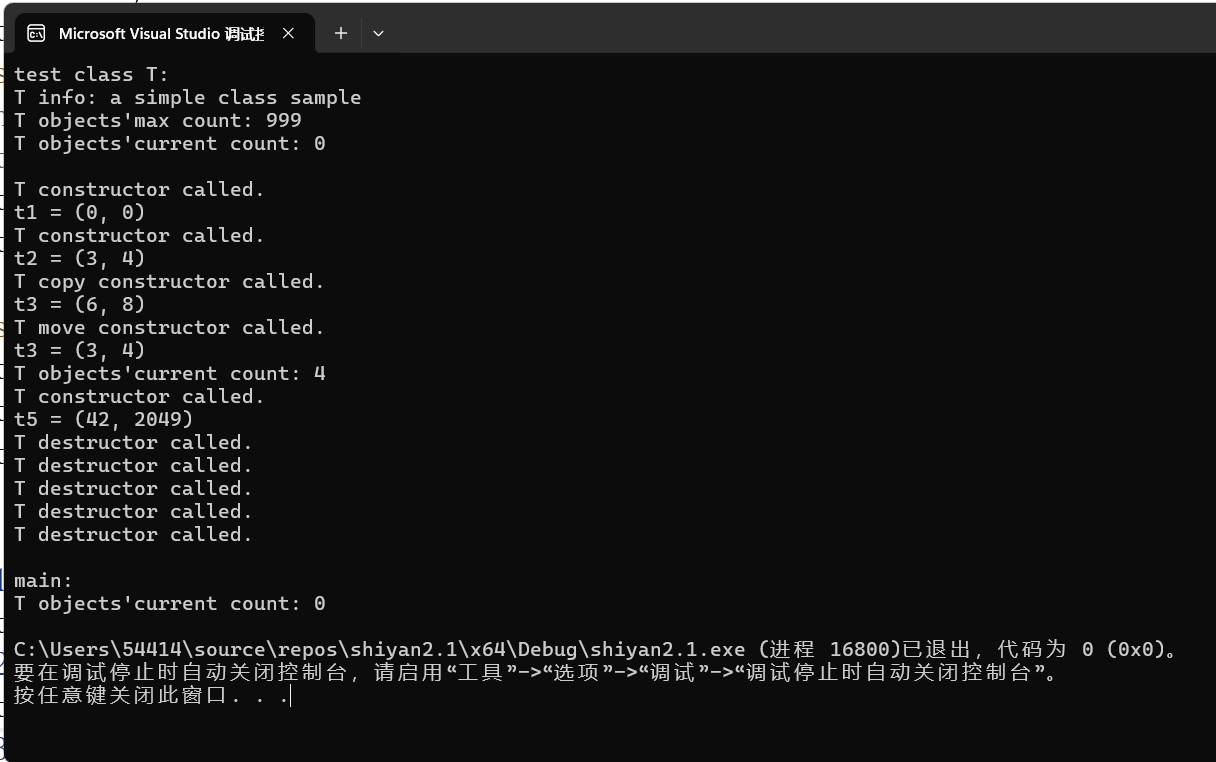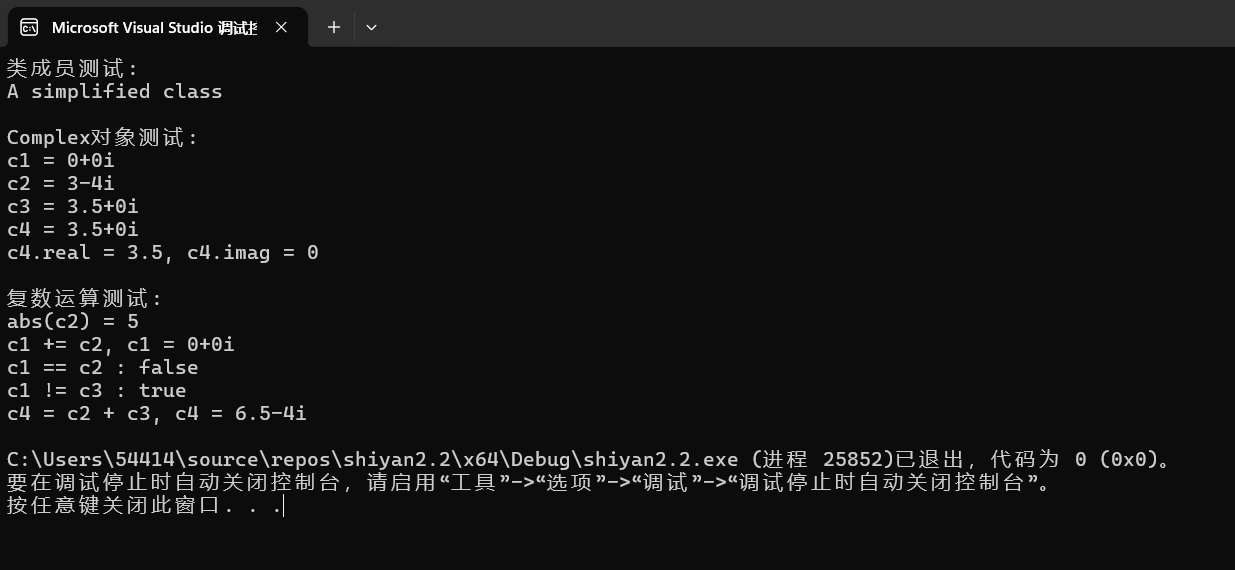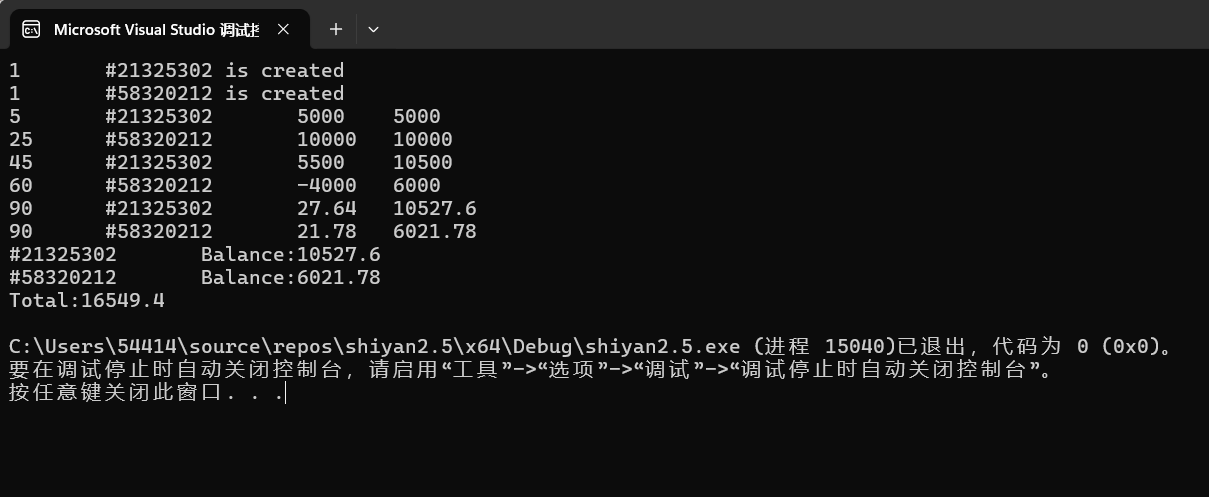实验2
task1
t.h
#pragma once #include <string> // 类T: 声明 class T { // 对象属性、方法 public: T(int x = 0, int y = 0); // 普通构造函数 T(const T& t); // 复制构造函数 T(T&& t); // 移动构造函数 ~T(); // 析构函数 void adjust(int ratio); // 按系数成倍调整数据 void display() const; // 以(m1, m2)形式显示T类对象信息 private: int m1, m2; // 类属性、方法 public: static int get_cnt(); // 显示当前T类对象总数 public: static const std::string doc; // 类T的描述信息 static const int max_cnt; // 类T对象上限 private: static int cnt; // 当前T类对象数目 // 类T友元函数声明 friend void func(); }; // 普通函数声明 void func();
t.cpp
// 类T: 实现 // 普通函数实现 #include "t.h" #include <iostream> #include <string> using std::cout; using std::endl; using std::string; // static成员数据类外初始化 const std::string T::doc{ "a simple class sample" }; const int T::max_cnt = 999; int T::cnt = 0; // 对象方法 T::T(int x, int y) : m1{ x }, m2{ y } { ++cnt; cout << "T constructor called.\n"; } T::T(const T& t) : m1{ t.m1 }, m2{ t.m2 } { ++cnt; cout << "T copy constructor called.\n"; } T::T(T&& t) : m1{ t.m1 }, m2{ t.m2 } { ++cnt; cout << "T move constructor called.\n"; } T::~T() { --cnt; cout << "T destructor called.\n"; } void T::adjust(int ratio) { m1 *= ratio; m2 *= ratio; } void T::display() const { cout << "(" << m1 << ", " << m2 << ")"; } // 类方法 int T::get_cnt() { return cnt; } // 友元 void func() { T t5(42); t5.m2 = 2049; cout << "t5 = "; t5.display(); cout << endl; }
task1.cpp
#include "t.h" #include <iostream> using std::cout; using std::endl; void test(); int main() { test(); cout << "\nmain: \n"; cout << "T objects'current count: " << T::get_cnt() << endl; } void test() { cout << "test class T: \n"; cout << "T info: " << T::doc << endl; cout << "T objects'max count: " << T::max_cnt << endl; cout << "T objects'current count: " << T::get_cnt() << endl << endl; T t1; cout << "t1 = "; t1.display(); cout << endl; T t2(3, 4); cout << "t2 = "; t2.display(); cout << endl; T t3(t2); t3.adjust(2); cout << "t3 = "; t3.display(); cout << endl; T t4(std::move(t2)); cout << "t3 = "; t4.display(); cout << endl; cout << "T objects'current count: " << T::get_cnt() << endl; func(); }

question1.

找不到标识符
question2.
普通构造函数:正常使用
复制构造函数:用于通过一个已存在的对象来创建一个新对象。
移动构造函数:用于通过一个临时对象来创建一个新对象。
析构函数:释放内存。
question3.
不能
task2
complex.h
#pragma once #include <iostream> #include <cmath> class Complex { public: Complex(); // 默认构造函数 Complex(double real, double imag); // 构造函数 Complex(double real); // 单参构造函数 Complex(const Complex& other); // 拷贝构造函数 double get_real() const; // 返回实部 double get_imag() const; // 返回虚部 Complex add(const Complex& c); friend Complex add(const Complex& c1, const Complex& c2); // 复数相加 friend bool is_equal(const Complex& c1, const Complex& c2); // 判断相等 friend bool is_not_equal(const Complex& c1, const Complex& c2); // 判断不相等 friend double abs(Complex& c); // 取模 friend void output(const Complex& c); // 输出复数 static std::string doc; private: double real; // 实部 double imag; // 虚部 };
complex.cpp
#include "Complex.h" #include<iostream> // 默认构造函数 Complex::Complex() : real(0), imag(0) {} // 构造函数 Complex::Complex(double real, double imag) : real(real), imag(imag) {} //单参构造函数 Complex::Complex(double real) : real(real), imag(0) {} // 拷贝构造函数 Complex::Complex(const Complex& other) : real(other.real), imag(other.imag) {} // 返回实部 double Complex::get_real() const { return real; } // 返回虚部 double Complex::get_imag() const { return imag; } Complex Complex::add(const Complex& c) { return Complex(real + c.real, imag + c.imag); } // 复数相加 Complex add(const Complex& c1, const Complex& c2) { return Complex(c1.real + c2.real, c1.imag + c2.imag); } // 判断相等 bool is_equal(const Complex& c1, const Complex& c2) { return (c1.real == c2.real && c1.imag == c2.imag); } // 判断不相等 bool is_not_equal(const Complex& c1, const Complex& c2) { return !is_equal(c1, c2); } // 取模 double abs(Complex& c) { return sqrt(c.real * c.real + c.imag * c.imag); } // 输出复数 void output(const Complex& c) { std::cout << c.real << (c.imag >= 0 ? "+" : "") << c.imag << "i"; } std::string Complex::doc = "A simplified class";
task2.cpp
#include "Complex.h" #include <iostream> using std::cout; using std::endl; using std::boolalpha; void test() { cout << "类成员测试: " << endl; cout << Complex::doc << endl; cout << endl; cout << "Complex对象测试: " << endl; Complex c1; Complex c2(3, -4); const Complex c3(3.5); Complex c4(c3); cout << "c1 = "; output(c1); cout << endl; cout << "c2 = "; output(c2); cout << endl; cout << "c3 = "; output(c3); cout << endl; cout << "c4 = "; output(c4); cout << endl; cout << "c4.real = " << c4.get_real() << ", c4.imag = " << c4.get_imag() << endl; cout << endl; cout << "复数运算测试: " << endl; cout << "abs(c2) = " << abs(c2) << endl; c1.add(c2); cout << "c1 += c2, c1 = "; output(c1); cout << endl; cout << boolalpha; cout << "c1 == c2 : " << is_equal(c1, c2) << endl; cout << "c1 != c3 : " << is_not_equal(c1, c3) << endl; c4 = add(c2, c3); cout << "c4 = c2 + c3, c4 = "; output(c4); cout << endl; } int main() { test(); }

task3
#include <iostream> #include <complex> using std::cout; using std::endl; using std::boolalpha; using std::complex; void test() { cout << "标准库模板类comple测试: " << endl; complex<double> c1; complex<double> c2(3, -4); const complex<double> c3(3.5); complex<double> c4(c3); cout << "c1 = " << c1 << endl; cout << "c2 = " << c2 << endl; cout << "c3 = " << c3 << endl; cout << "c4 = " << c4 << endl; cout << "c4.real = " << c4.real() << ", c4.imag = " << c4.imag() << endl; cout << endl; cout << "复数运算测试: " << endl; cout << "abs(c2) = " << abs(c2) << endl; c1 += c2; cout << "c1 += c2, c1 = " << c1 << endl; cout << boolalpha; cout << "c1 == c2 : " << (c1 == c2) << endl; cout << "c1 != c3 : " << (c1 != c3) << endl; c4 = c2 + c3; cout << "c4 = c2 + c3, c4 = " << c4 << endl; } int main() { test(); }

接口有默认构造函数,普通构造函数,单参构造函数,复制构造函数,real,imag,abs,复数加法,判断复数是否相等
任务2.
1.c1 += c2代替c1.add(c2),(c1 == c2)代替is_equal(c1, c2),(c1 != c3)代替is_not_equal(c1, c3),对象名能直接输出.
2:可以用运算符重载来简化类的操作.
task4
f.h
#pragma once #include <iostream> #include <numeric> class Fraction { private: int up; // 分子 int down; // 分母 void simplify(); // 简化分数 public: static const std::string doc; // 描述信息 Fraction(int numerator = 0, int denominator = 1); // 构造函数 Fraction(const Fraction& f); // 拷贝构造函数 int get_up() const; // 返回分子 int get_down() const; // 返回分母 Fraction negative() const; // 求负 friend void output(const Fraction& f); //输出 friend Fraction add(const Fraction& f1, const Fraction& f2); friend Fraction sub(const Fraction& f1, const Fraction& f2); friend Fraction mul(const Fraction& f1, const Fraction& f2); friend Fraction div(const Fraction& f1, const Fraction& f2); }; int gcd1(int a, int b);
f.cpp
#include "Fraction.h" #include<iostream> const std::string Fraction::doc = "Fraction类 v 0.01版. 目前仅支持分数对象的构造、输出、加/减/乘/除运算。"; int gcd1(int a, int b) { return b == 0 ? a : gcd1(b, a % b); } Fraction::Fraction(int numerator, int denominator) : up(numerator), down(denominator) { if (down == 0) { std::cout << "分母不能为0" << std::endl; } simplify(); } Fraction::Fraction(const Fraction& f) : up(f.up), down(f.down) {} void Fraction::simplify() { int gcd = gcd1(up, down); up /= gcd; down /= gcd; if (down < 0) { // 保持负号在分子上 up = -up; down = -down; } } int Fraction::get_up() const { return up; } int Fraction::get_down() const { return down; } Fraction Fraction::negative() const { return Fraction(-up, down); } void output(const Fraction& f) { if (f.down != 0) { if (f.down == 1) std::cout << f.up << std::endl; else std::cout << f.up << "/" << f.down << std::endl; } } Fraction add(const Fraction& f1, const Fraction& f2) { return Fraction(f1.up * f2.down + f2.up * f1.down, f1.down * f2.down); } Fraction sub(const Fraction& f1, const Fraction& f2) { return Fraction(f1.up * f2.down - f2.up * f1.down, f1.down * f2.down); } Fraction mul(const Fraction& f1, const Fraction& f2) { return Fraction(f1.up * f2.up, f1.down * f2.down); } Fraction div(const Fraction& f1, const Fraction& f2) { if (f2.up == 0) { std::cout << "分母不能为0" << std::endl; } else return Fraction(f1.up * f2.down, f1.down * f2.up); }
task4.cpp
#include "Fraction.h" #include <iostream> using std::cout; using std::endl; void test1() { cout << "Fraction类测试: " << endl; cout << Fraction::doc << endl << endl; Fraction f1(5); Fraction f2(3, -4), f3(-18, 12); Fraction f4(f3); cout << "f1 = "; output(f1); cout << endl; cout << "f2 = "; output(f2); cout << endl; cout << "f3 = "; output(f3); cout << endl; cout << "f4 = "; output(f4); cout << endl; Fraction f5(f4.negative()); cout << "f5 = "; output(f5); cout << endl; cout << "f5.get_up() = " << f5.get_up() << ", f5.get_down() = " << f5.get_down() << endl; cout << "f1 + f2 = "; output(add(f1, f2)); cout << endl; cout << "f1 - f2 = "; output(sub(f1, f2)); cout << endl; cout << "f1 * f2 = "; output(mul(f1, f2)); cout << endl; cout << "f1 / f2 = "; output(div(f1, f2)); cout << endl; cout << "f4 + f5 = "; output(add(f4, f5)); cout << endl; } void test2() { Fraction f6(42, 55), f7(0, 3); cout << "f6 = "; output(f6); cout << endl; cout << "f7 = "; output(f7); cout << endl; cout << "f6 / f7 = "; output(div(f6, f7)); cout << endl; } int main() { cout << "测试1: Fraction类基础功能测试\n"; test1(); cout << "\n测试2: 分母为0测试: \n"; test2(); }

task5
account.h
#pragma once class SavingsAccount { private: int id; double balance; double rate; int lastDate; double accumulation; static double total; void record(int date, double amount); double accumulate(int date) const { return accumulation + balance * (date - lastDate); } public: SavingsAccount(int date, int id, double rate); int getId() const { return id; } double getBalance() const { return balance; } double getRate() const { return rate; } static double getTotal() { return total; } void deposit(int date, double amount); void withdraw(int date, double amount); void settle(int date); void show() const; };
account.cpp
#include "account.h" #include <cmath> #include <iostream> using namespace std; double SavingsAccount::total = 0; SavingsAccount::SavingsAccount(int date, int id, double rate) :id(id), balance(0), rate(rate), lastDate(date), accumulation(0) { cout << date << "\t#" << id << " is created" << endl; } void SavingsAccount::record(int date, double amount) { accumulation = accumulate(date); lastDate = date; amount = floor(amount * 100 + 0.5) / 100; balance += amount; total += amount; cout << date << "\t#" << id << "\t" << amount << "\t" << balance << endl; } void SavingsAccount::deposit(int date, double amount) { record(date, amount); } void SavingsAccount::withdraw(int date, double amount) { if (amount > getBalance()) cout << "Error:not enough money" << endl; else record(date, -amount); } void SavingsAccount::settle(int date) { double interest = accumulate(date) * rate / 365; if (interest != 0) record(date, interest); accumulation = 0; } void SavingsAccount::show() const { cout << "#" << id << "\tBalance:" << balance; }
task5.cpp
#include "account.h" #include <iostream> using namespace std; int main() { SavingsAccount sa0(1, 21325302, 0.015); SavingsAccount sa1(1, 58320212, 0.015); sa0.deposit(5, 5000); sa1.deposit(25, 10000); sa0.deposit(45, 5500); sa1.withdraw(60, 4000); sa0.settle(90); sa1.settle(90); sa0.show(); cout << endl; sa1.show(); cout << endl; cout << "Total:" << SavingsAccount::getTotal() << endl; return 0; }




